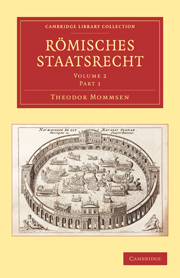Book contents
- Frontmatter
- Contents
- Das Königthum S. 3—15
- Die magistratische Befugniss des Oberpontifex S. 16—69
- Das Consulat S. 70—124
- Die Dictatur S. 125—153
- Das Reiterführeramt S. 156—164
- Der Consulartribunat S. 165—175
- Die Prätur S. 176—216
- Die Provinzialstatthalterschaft S. 217—246
- Der Volkstribunat S. 247—303
- Die Censur S. 304—442
- Die Aedilität S. 443—491
- Die Quästur S. 492—538
- Magistratische Offiziere S. 539—545
- Die magistratische Geschwornenleitung S. 546—555
- Der Vigintisex-, später Vigintivirat S. 556—571
- Ausserordentliche Beamte für die Reservatrechte der Gemeinde S. 572—600
- Ausserordentliche Aushülfsbeamte S. 601—637
- Die Senatsboten (legati) S. 638—661
- Die ausserordentlichen constituirenden Gewalten S. 662—697
Die Senatsboten (legati) S. 638—661
Published online by Cambridge University Press: 29 August 2010
- Frontmatter
- Contents
- Das Königthum S. 3—15
- Die magistratische Befugniss des Oberpontifex S. 16—69
- Das Consulat S. 70—124
- Die Dictatur S. 125—153
- Das Reiterführeramt S. 156—164
- Der Consulartribunat S. 165—175
- Die Prätur S. 176—216
- Die Provinzialstatthalterschaft S. 217—246
- Der Volkstribunat S. 247—303
- Die Censur S. 304—442
- Die Aedilität S. 443—491
- Die Quästur S. 492—538
- Magistratische Offiziere S. 539—545
- Die magistratische Geschwornenleitung S. 546—555
- Der Vigintisex-, später Vigintivirat S. 556—571
- Ausserordentliche Beamte für die Reservatrechte der Gemeinde S. 572—600
- Ausserordentliche Aushülfsbeamte S. 601—637
- Die Senatsboten (legati) S. 638—661
- Die ausserordentlichen constituirenden Gewalten S. 662—697
Summary
Das Recht des Senats im Namen der Gemeinde Botschaften theils an auswärtige Staaten, theils an die römischeti Oberbeamten zu entsenden ist, wie alle dem patricisch - plebejischen Senat zukommenden, nicht ursprünglich, sondern späterer Entstehung. Die Verhandlung der Gemeinde mit den auswärtigen Staaten, so weit sie nicht durch die Magistrate selbst stattfindet, liegt in ältester Zeit dem Fetialencollegium ob, und diesen ältesten Gemeindeboten wird die Autorisation nicht vom Senat, sondern von dem Magistrat ertheilt). Vermittler aber zwischen dem Senat und den Gemeindebeamten hat es in fräherer Zeit, als selbst der Krieg die letzteren nicht weit von Rom entfernte, kaum in irgendwie bestimmter Form gegeben. Was über die ohne Zweifel stufenweise erfolgte Erwerbung des Botschaftsrechts dureh den Senat sich etwa vermuthen lässt, wird bei diesem vorkommen; die Institution der Senatsboten selbst aber soil hier dargelegt werden). Allerdings stehen die vom Senat bestellten legati in principiellem Gegensatz zu den von der Gemeinde ernannten Magistraten); allein was von dem Oberpontifex (S. 18), gilt in noch höherem Grade von den Legaten, dass sie vielfältig magistratische Rechte ausüben; und die Entwickelung der Magistratur, insonderheit der Provinzialstatthalterschaft und der daraus entwickelten kaiserlichen Gewalt, würde ohne Eingehen auf die Senatscommissarien unvollständig bleiben.
Die technische Bezeichnung des Entsendens und des Entsendetwerdens ist legare) und legari alicui oder ad aliquem), wăhrend griechisch umgekehrt heisst zum Gesandten bestellen, legare, Gesandter bei jemand sein, legari). Eine eigentlich substantivische dem griechischen gleichwerthige Bezeichnung besitzt die lateinische Sprache nicht, weil eben diese Stellung eine Function, kein Ami ist, wie das Gleiche gilt für die Function des Stellvertreters.
- Type
- Chapter
- Information
- Römisches Staatsrecht , pp. 638 - 661Publisher: Cambridge University PressPrint publication year: 2010



